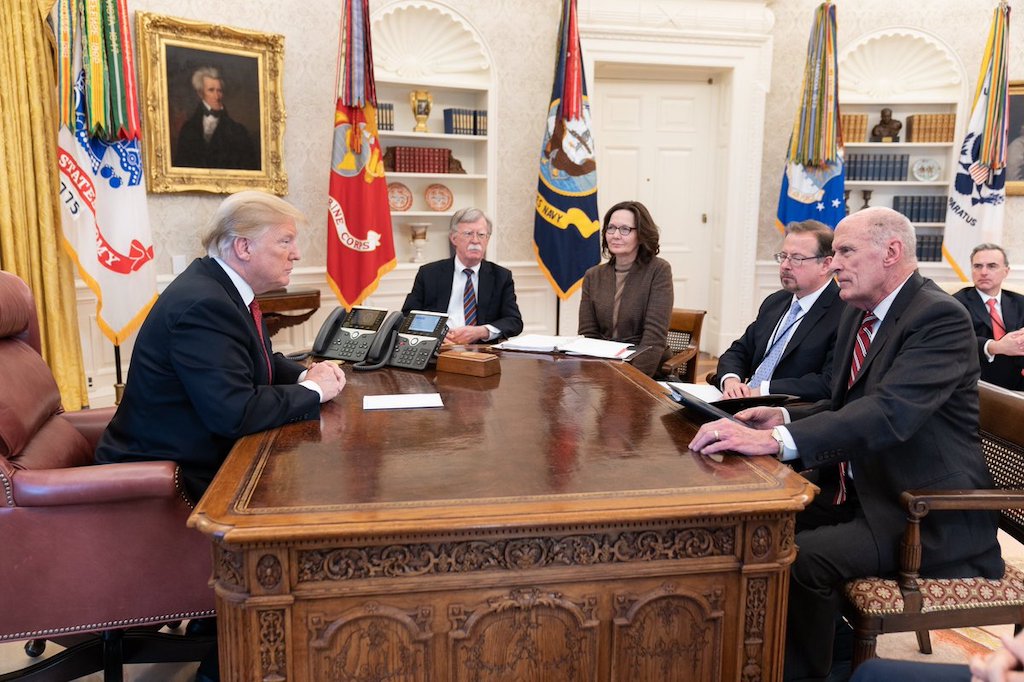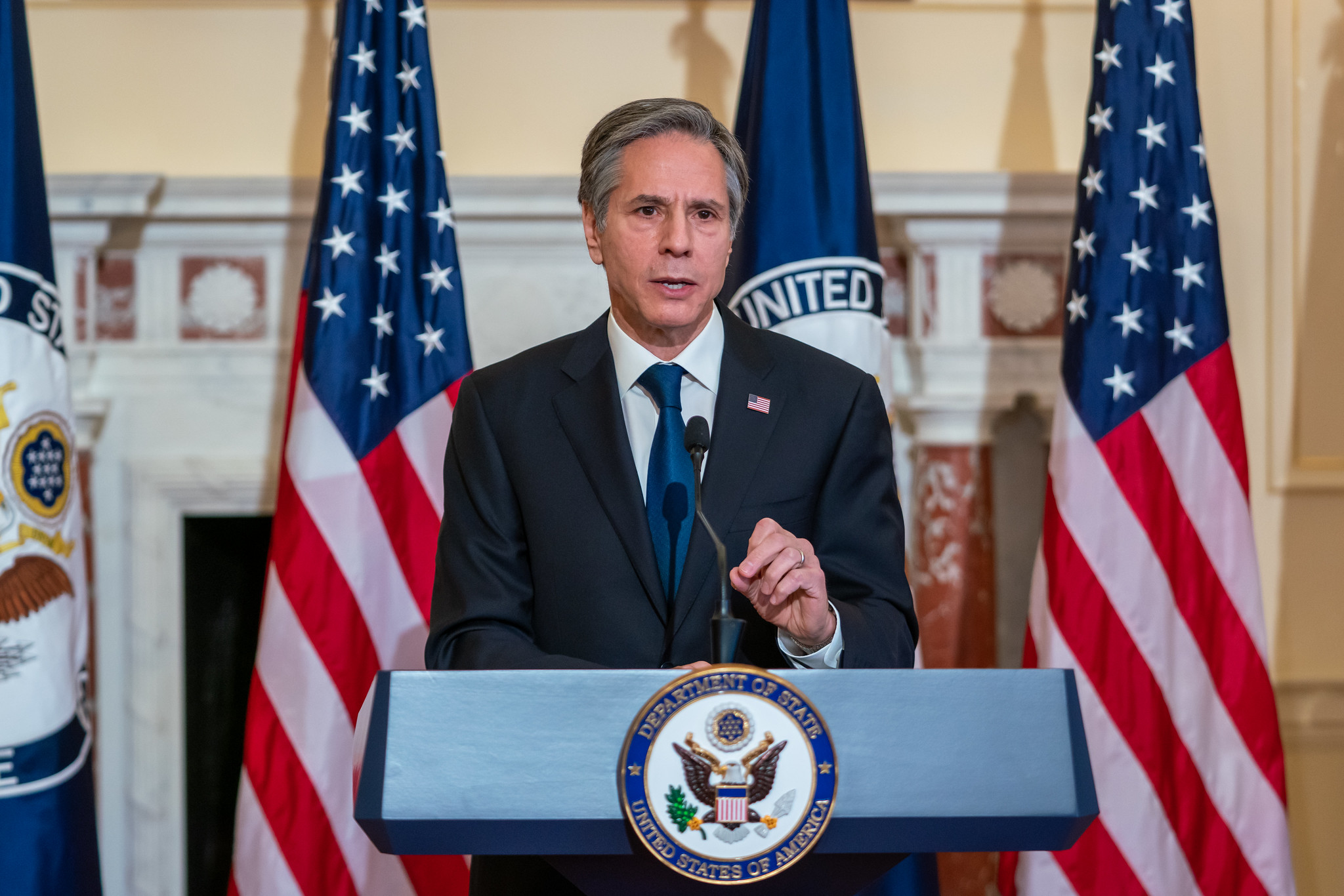Why Intelligence Leadership Won’t Resign in Response to Trump’s Criticisms
Earlier this week, CIA Director Gina Haspel, FBI Director Christopher Wray, NSA Director Paul Nakasone, National Geospatial-Intelligence Agency Director Robert Cardillo, Defense Intelligence Agency Director Robert Ashley and Director of National Intelligence Dan Coats testified in an open hearing to the Senate intelligence committee about global threats to U.S. national security.

Published by The Lawfare Institute
in Cooperation With

Earlier this week, CIA Director Gina Haspel, FBI Director Christopher Wray, NSA Director Paul Nakasone, National Geospatial-Intelligence Agency Director Robert Cardillo, Defense Intelligence Agency Director Robert Ashley and Director of National Intelligence Dan Coats testified in an open hearing to the Senate intelligence committee about global threats to U.S. national security. Among their analytic highlights: Russian efforts to undermine democratic governments and influence elections endure; North Korea remains “unlikely” to discard its nuclear weapons and production capabilities; Iran has stayed in general compliance with the Joint Comprehensive Plan of Action on nuclear development; and a non-defeated Islamic State still stands capable of conducting attacks.
Many of their judgments differed from the president’s public descriptions of these topics. CNN reports that early on the morning of Jan. 30, television chyrons relating the DNI’s testimony, and its apparent clash with the president’s claims about North Korea, drove an enraged Trump to “rant” about Coats. Soon thereafter, the president publicly expressed a lack of confidence in intelligence leaders, using Twitter to call them “passive and naïve” and to suggest that they “should go back to school.”
This type of public scolding may look like a solid basis for many self-respecting leaders to step down in protest. After all, it was just last month that Trump's sudden declaration of victory against the Islamic State and blindsiding announcement of troop withdrawals from Syria prompted Secretary of Defense Jim Mattis to leave his post. “The question for me is,” retired CIA senior operations officer John Sipher told Voice of America in response to the president’s frustration with intelligence community leadership, “at what point do these intelligence chiefs quit.”
But top intelligence leaders, for now, aren’t resigning.
Among the many factors at play, here are four plausible reasons—alone or in combination with each other—to help understand why Haspel, Wray, Nakasone, Cardillo, Ashley and Coats are staying put.
First, today’s intelligence leaders are all too aware that leaving in protest would open their positions to nominees more likely than they are to give in to pressure from the president. Recall the reported sighs of relief out of CIA headquarters when the president nominated career CIA employee Haspel to replace departing CIA chief Pompeo. Many were concerned about what would happen if the president picked someone to run the agency who was less inclined to appreciate and defend the integrity of the intelligence function. Remaining in place, even in difficult times, becomes easier when one believes that resigning could allow a less principled successor to inflict grave damage on the institution, perhaps even the country.
Second, intelligence officers have faced pushback on intelligence judgments, and even outright hostility to uncomfortable truths, many times before. Presidents and other senior government officials, in fact, have routinely challenged intelligence leaders and briefers (sometimes aggressively) based on inadequate sourcing, weak argumentation, or both. I’ve been on the receiving end of some of those reactions: Each such experience with an intense policymaking customer hardens intelligence officers against the shock of subsequent pressure.
Of course, while previous presidents have registered disdain for various intelligence judgments in private, Trump challenges assessments publicly and appears to do so in reaction to negative press more than on careful study of the underlying classified material. But the core truth remains: A 30-plus year veteran of the intelligence business like Haspel, and even a former 16-year senator and ambassador like Coats, has lived through many a bruising disagreement.
Third, intelligence leaders, more than chiefs of other agencies and departments, have traditionally set public service aside upon finishing their careers. Consequently, there’s little motivation to resign to stake out a political position of disagreement with the president’s policies. The same is not always true for leadership elsewhere in government. Consider the case of Alexander Haig, who left his job as secretary of state suddenly in 1982, taking a public swipe at Reagan’s foreign policy direction as he departed—and later ran for president himself.
The major exception, of course, is George H.W. Bush, who ran the CIA for a year under President Gerald Ford. But Bush is the exception that proves the rule. Unlike his predecessors at the agency, he was a politician on the rise when appointed to CIA, and even he made no move to resign while in office to stake out an independent path.
The closest an intelligence leader has come in recent decades to resigning over a specific presidential act came in 1998. As part of the final Israeli-Palestinian negotiations that led to the Wye River Memorandum, the Israelis made a hard play for the early release of convicted Israeli spy Jonathan Pollard. President Clinton, with much riding on a successful agreement, seemed inclined to play along. CIA Director George Tenet caught wind of the effort and told President Clinton, “if Pollard is released, I will no longer be the Director of Central Intelligence in the morning.” In the end, Clinton stood up to the Israelis and Tenet stayed put. Even if Tenet would have resigned, though, he would have done so out of a reflection of his diminished credibility in the building, not to position himself for a future appointment or higher office.
Fourth, and probably most importantly, intelligence leaders more than Cabinet officers feel responsible to not only the president but also many other U.S. government officials. The secretary of state, for example, sits subordinate only to the chief executive. By contrast, most CIA directors and DNIs have provided intelligence to and interacted extensively with dozens of top officials beyond the “First Customer,” the national security adviser, secretaries of all foreign policy-related departments and even sub-Cabinet officials. Intelligence leaders out of favor with the president have generally remained in their positions and kept prodding their subordinates to carry on collecting and analyzing intelligence to serve the customers that still seem to appreciate it. The bureaucratic norm of putting one’s head down and getting to work lives particularly strong in intelligence circles.
Despite their apparent disagreements with the president, the chiefs of intelligence agencies will probably not, as Trump suggested, “go back to school”—or otherwise leave their posts.





